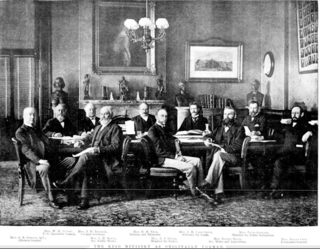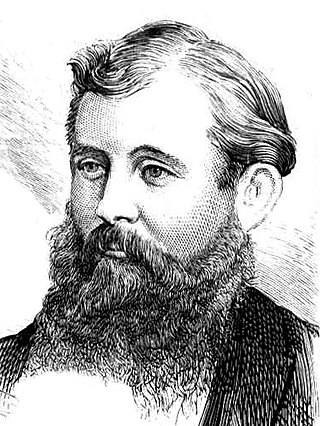Related Research Articles
Members of the New South Wales Legislative Assembly who served in the 18th parliament of New South Wales held their seats between 1898 and 1901. They were elected at the 1898 colonial election on 27 July 1898. The Speaker was Sir Joseph Abbott until 12 June 1900 and then William McCourt.
This is a list of members of the New South Wales Legislative Assembly who served in the 17th parliament of New South Wales from 1895 to 1898. They were elected at the 1895 colonial election on 24 July 1895. The Speaker was Sir Joseph Abbott.
Members of the New South Wales Legislative Assembly who served in the 15th parliament of New South Wales held their seats from 1891 to 1894 They were elected at the 1891 colonial election between 17 June and 3 July 1891. The Speaker was Sir Joseph Palmer Abbott.
Members of the New South Wales Legislative Assembly who served in the 14th parliament of New South Wales held their seats from 1889 to 1891. They were elected at the 1889 colonial election between 1 and 16 February 1889. The Speaker was James Young until 21 October 1890 and then Joseph Palmer Abbott.
Members of the New South Wales Legislative Assembly who served in the 13th parliament of New South Wales held their seats from 1887 to 1889. They were elected at the 1887 colonial election between 4 and 26 February 1887. The Speaker was James Young. This was the first parliament to have recognizable party groups.
Balmain, an electoral district of the Legislative Assembly in the Australian state of New South Wales, has had three incarnations since it was established in 1880. It expanded from 1 to 2 to 3 to 4 members before being abolished in 1894. It was re-established in 1904 returning 1 member until 1920. When multiple member constituencies were established using the Hare-Clark single transferable vote in 1920, Balmain returned 5 members. It had a single member from 1927 when the state returned to single member electorates. It was abolished in 1991 and largely replaced by Port Jackson which included the Sydney CBD. It was re-established in 2007 when Port Jackson was abolished.

The Reid ministry was the 28th ministry of the Colony of New South Wales, and was led by the 12th Premier, George Reid. The title of Premier was widely used to refer to the Leader of Government, but was not a formal position in the government until 1920. Instead the Premier was appointed to another portfolio, usually Colonial Secretary but on this occasion Reid took the portfolio of Colonial Treasurer until July 1899 and then Attorney General.
Tamworth, an electoral district of the Legislative Assembly in the Australian state of New South Wales, has had two incarnations from 1890 until 1920 and from 1927 until the present. It initially returned two members until 1894 and has since returned a single member for all subsequent elections.
Bathurst, an electoral district of the Legislative Assembly in the Australian state of New South Wales, has continuously existed since 1859.
Monaro, also known as Maneroo (1856–58), Monara (1858–1879) and Manaro (1894–1904), an electoral district of the Legislative Assembly in the Australian state of New South Wales, has had two incarnations, from 1858 to 1920 and from 1927 to the present.

John Daniel FitzGerald was a politician, union official, journalist and barrister in New South Wales, Australia.

John Fitzgerald Burns was an Australian politician, member of the Parliament of New South Wales, Postmaster-General in the 1870s and Colonial Treasurer in the 1880s.
The 1894 New South Wales colonial election was for 125 electoral districts, with each district returning one member. The election was conducted on the basis of a simple majority or first-past-the-post voting system. There were three significant changes from the 1891 election, the abolition of multi-member constituencies, the abolition of plural voting where an elector had property or residence in more than one electorate and that polls for every district were held on the same day. The number of seats was reduced from 141 to 125. In this election, in 74 electorates the winning candidate received less than 50% of the votes, while 1 was uncontested. The average number of enrolled voters per electorate was 2,046, ranging from Lismore (1,360) to Marrickville (2,924).
Namoi, an electoral district of the Legislative Assembly in the Australian state of New South Wales had two incarnations, from 1880 to 1894 and from 1904 to 1950.
East Sydney, an electoral district of the Legislative Assembly in the Australian state of New South Wales was created in 1859 and abolished in 1894.
A by-election for the seat of Hartley in the New South Wales Legislative Assembly was held on 14 August 1894 because Joseph Cook had been appointed Postmaster General in the Reid ministry. Such ministerial by-elections were usually uncontested and four ministers were re-elected unopposed, James Brunker, Joseph Carruthers, Jacob Garrard (Sherbrooke) and James Young. A poll was required in Bathurst, Hartley, Singleton and Sydney-King however all were comfortably re-elected.
Sydney-King, an electoral district of the Legislative Assembly in the Australian state of New South Wales, was created in 1894 and abolished in 1904.
A by-election for the seat of Bathurst in the New South Wales Legislative Assembly was held on 14 August 1894 because Sydney Smith had been appointed Secretary for Mines and Agriculture in the Reid ministry. Such ministerial by-elections were usually uncontested and four ministers were re-elected unopposed, James Brunker, Joseph Carruthers, Jacob Garrard (Sherbrooke) and James Young. A poll was required in Bathurst, Hartley, Singleton and Sydney-King however all were comfortably re-elected.
A by-election for the seat of Sydney-King in the New South Wales Legislative Assembly was held on 11 August 1894 because George Reid had been appointed Premier and Colonial Treasurer, forming the Reid ministry. Such ministerial by-elections were usually uncontested and four ministers were re-elected unopposed, James Brunker, Joseph Carruthers, Jacob Garrard (Sherbrooke) and James Young. A poll was required in Bathurst, Hartley, Singleton and Sydney-King however all were comfortably re-elected.
A by-election for the seat of Singleton in the New South Wales Legislative Assembly was held on 14 August 1894 because Albert Gould had been appointed Minister for Justice in the Reid ministry. Such ministerial by-elections were usually uncontested and four ministers were re-elected unopposed, James Brunker, Joseph Carruthers, Jacob Garrard (Sherbrooke) and James Young. A poll was required in Bathurst, Hartley, Singleton and Sydney-King however all were comfortably re-elected.
References
- ↑ Green, Antony. "1894 Elected members". New South Wales Election Results 1856-2007. Parliament of New South Wales . Retrieved 14 April 2020.
- ↑ "Former members of the New South Wales Parliament, 1856–2006". New South Wales Parliament. Retrieved 14 April 2020.
- ↑ "Part 5B - Members returned for each electorate" (PDF). New South Wales Parliamentary Record. Parliament of New South Wales . Retrieved 14 April 2020.
- ↑ Green, Antony. "Results of 1894–95 by-elections". New South Wales Election Results 1856-2007. Parliament of New South Wales . Retrieved 6 May 2020.
